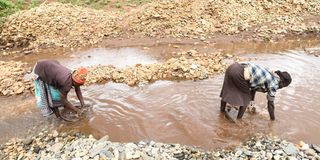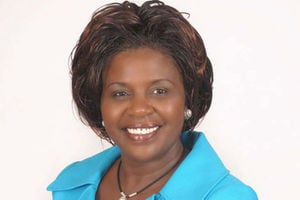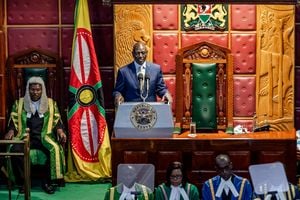Cultural roles weighing women down in pastoral North Rift

Artisanal gold miners in West Pokot. Most women have turned to mining to provide their families as demanded of them by their culture.
What you need to know:
- Among the Turkana and the Pokot, only men are allowed to own cattle, but for pride.
- Women say their husbands just stroll around, only to return home demanding food.
As Kenyan novelist Margaret Ogola captured in her book, The River and the Source, a home without daughters is like a spring without a source, so is the place of females among pastoral communities in the North Rift.
Women and girls in this region are the pinnacle of society, despite facing harmful traditions such as female genital mutilation, early marriage and lack of education. Here, one cardinal but unwritten rule is supreme: women are the providers for their families and are supposed to pay for their children’s education.
The region being largely semi-arid, subsistence crop farming is practised. Livestock rearing is the main economic activity, but women rarely own the animals. Patriarchy further impedes women’s political and socioeconomic growth.
It is typical to see men, draped in shukaa, relax under trees as women toil and moil under the scorching sun to be able to put food on the table, clear family bills and even build a home.
West Pokot
In West Pokot County along the banks of River Muruny, we encounter Ms Sellina Rotugei. With a child strapped on the back, the artisanal miner, armed with a metallic basin (karai), scoops sand in search of gold specks. Other women are breaking limestone rocks into small pieces for sale along the Kitale-Lodwar highway.
“This is a trade I have been practising all my life. Several generations, from my great grandmother right down to us, have been doing this all through. With the meagre proceeds from the trade, we manage to bring food on the table,” she says.
Ms Rotugei, in her early 30s and a mother of six, regrets that culture is weighing down on the women in the region.
“With this arduous work, which barely fetches Sh300 a day, we are expected to feed the family, including the men whom you see lazing around under trees. Theirs is to come for food, which is provided without question, and sire children,” she laments.
Along the river as far as one can see, women are lined up scooping sand with mabati basins before going to the river to sieve it out, leaving out tiny specks of gold, which they pour into smaller tins ready for the market.The backbreaking exercise is repeated throughout the day.
Another miner, Ms Mary Chepkolul, says what they get from the river is for family subsistence only. “We are not allowed to own animals or even sell them to pay family bills.
This region favours animal keeping, which culture prevents women from having. This is just a vicious cycle. It should end,” complained the mother of seven.
“We have no alternative to provide for our families because of the culture and where society has placed us. Our daughters, who should be in school, are here with us in the river mining gold.”
She can only hope that their daughters will acquire education to change the story. Like her peers, she longs for a day when her husband will come home with goodies for the family and spare them the agony.
Ms Jane Riononguraka says if they fail to provide for their families, their husbands will be on their necks and this scares them.
“If any woman dares question the skewed responsibilities in society, they should be ready to face the wrath of the men that will eventually lead to the council of elders. So we die in silence.”
However, Mzee John Lotop, a village elder, says their hands are tied as culture has spelt out the roles of women.
“Livestock is a man’s pride and prestige. They are supposed to own as many as possible as a way of gaining status and they are supposed to provide protection to the families. Women are dictated to provide for the family,” he says.
He adds that unless the culture is done away with, the cycle will go on, admitting that it is rolling back the progress of the community and increasing poverty levels.
Turkana County
In Turkana, women have raised concerns about public health threats due to retrogressive culture.
Ms Anna Ereng from Ameyan village says their traditions encourage open defaecation, especially in rural setups, where the population is largely pastoral.
“It is a taboo among the Turkana for a daughter-in-law to share a latrine with her father-in-law. This has led families to prefer relieving themselves in the bush rather than constructing a latrine. It is common knowledge even if we are provided with a latrine, open defaecation is still preferred,” she says.
She says girls are disadvantaged from childhood because they are groomed for marriage and denied education, while boys, despite herding in the grazing fields, get some form of education and are primed as leaders.
“It’s a taboo for a woman to own animals, let alone sell, without the approval of their husbands. This region, being an arid zone, favours subsistence crop farming and putting food on the table, which is entirely a woman’s affair. It is an arduous task,” she narrates.
Ms Mary Eyanae says they spend hours on end lining up for water from faraway wells. “We spend the whole day searching for water and by the time we come back home, it’s time to prepare supper. This is what we have been accustomed to, and we need emancipation.”
Leadership
On the political front, women are relegated to jostle for the woman representative and county assembly seats. Most women seldom meet the education requirements for leadership positions.
In Turkana, for instance, no woman has ever been elected as a a member of Parliament in a mixed-gender contest, and even with devolution, which birthed the county governments, none has been elected as governor or senator.
“Turkana is vast, insecurity-prone and very patriarchal. Women’s leadership is treated with a lot of mediocrity, making the political environment difficult for women,” says Mr Mike Ewoi, a Lodwar town resident.
“This society is largely male-controlled. Coupled with chauvinist culture and meagre resources, it puts roadblocks for women aspiring to elective seats.”





